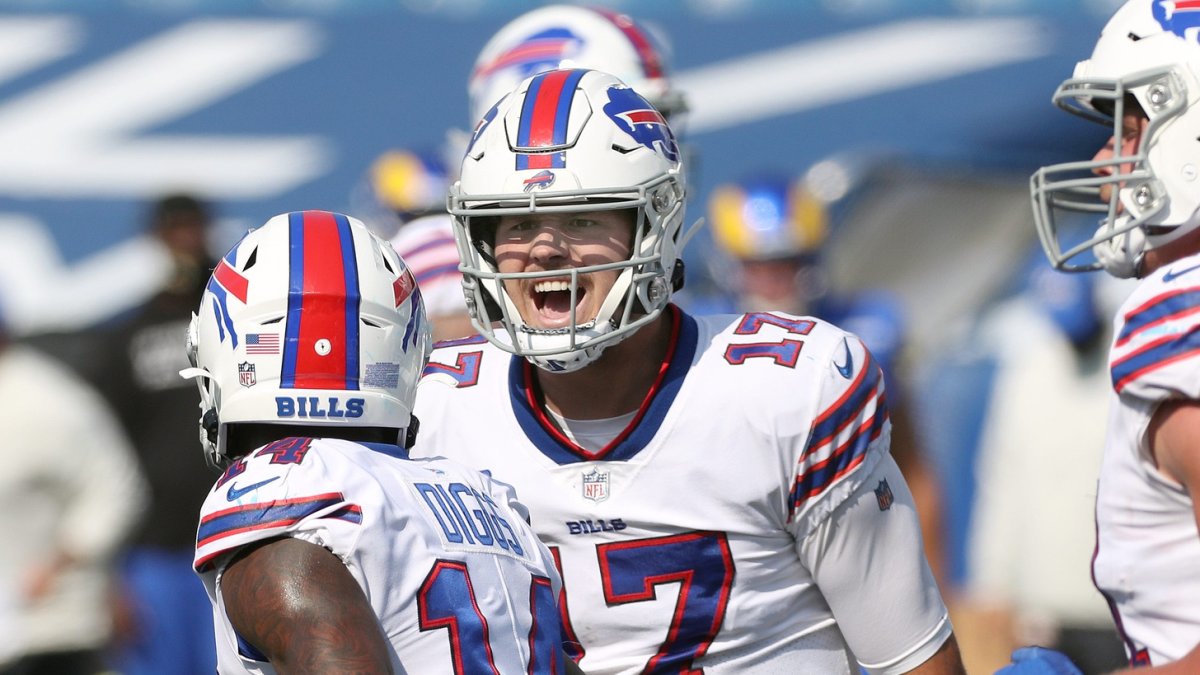Stacking is essential to success in DFS GPPs. The average user who submits a handful of lineups on any one DFS slate doesn’t stack nearly enough in their lineups. The art of stacking is a way to increase variance, which is the only option that offers enough upside to win a GPP tournament.
An overlooked approach is the game-level stack, which takes not only a quarterback and pass-catching option but also runs it back with a pass-catcher or a running back from the opposing team.
We see in our introductory article on stacking that if we hit on the correct quarterback and wide receiver, a player from the opposing team is typically going to be worthwhile to pair with this combination to apply more lineup correlation into your roster builds.
This provides inherent upside to our lineups — if we hit on the correct quarterback, two or more additional lineup spots are typically hit on by the simple fact that they are highly correlated to our quarterback play. If your quarterback is a miss, the rest of your lineup is likely in a similar situation, as it is hard to pull off a quality finish in a GPP contest with a dud at the signal-caller position.
Focusing on this approach of identifying quarterbacks who could be hits, we have built a model to project who is most likely to finish as the highest-scoring quarterback on the main slate based on fantasy projections, opponent-adjusted grades and betting market lines. Utilizing correlations for how fantasy points are distributed at the game level, we can then see the correct framework for how to approach roster construction for a game stack.
WEEK 9 REVIEW
Week 9 brought a diversified set of stacks to the top of leaderboards. Only four of the top 10 lineups in the DraftKings Milly Maker used a game stack, with various team stacks being the preferred route. Drew Lock and Jerry Jeudy was a part of a game stack I mentioned last week, and it took the top spot in the Milly Maker contest.
Combinations of Chiefs and Panthers stacks were scattered throughout the top 10, with some of them hitting on the right combination of players from each team. The model was lower on the probability of either quarterback in this matchup being the top-scoring signal-caller, but the opportunity existed for skill position players at other positions.
The fact that it was the third-highest total and produced the best shootout environment shouldn’t come as a surprise. Since numerous stacks produced similar results, the key was to get in lower-owned running back options in Christian McCaffrey and Dalvin Cook. As obvious as it was in hindsight, only 2% of lineups had both high-salary running backs in their lineups. The best path to allow this was through the Drew Lock and Jerry Jeudy stack, which was in fewer than .5% of lineups.
The mean total for Week 10 is slightly higher than last week, which makes it the fifth-highest mean for a week since 2010. The lull in scoring disappeared quickly, which should cause game-level stack ownership to be spread out. There is no obvious chalk, meaning to load up on a situation if you have a conviction about a certain play or game.
There are a number of game stack options with only two games currently having a total above 51. Six games sit in the 48-51 range, which provides numerous opportunities for games to go overlooked. This model is lower on the Buccaneers versus Panthers NFC South showdown and the 49ers versus Saints matchup. Chargers versus Dolphins has some initial appeal, but with so many worthwhile options, it doesn’t look like the most likely source for fantasy points in Week 10.
HIGH-OWNED OPTIONS
BUFFALO BILLS @ ARIZONA CARDINALS
The eight-point correction to this opening week total is 3.5 points more than any other line movement toward the over in 2020. This is unprecedented market movement, especially in this direction, with totals usually dropping only this much because of weather or injury. How the DFS market handles this matchup will determine who finishes atop leaderboards in Week 10.
Exclusive content for premium subscribers

WANT TO KEEP READING?
Dominate Fantasy Football & Betting with AI-Powered Data & Tools Trusted By All 32 Teams
Already have a subscription? Log in



 © 2025 PFF - all rights reserved.
© 2025 PFF - all rights reserved.